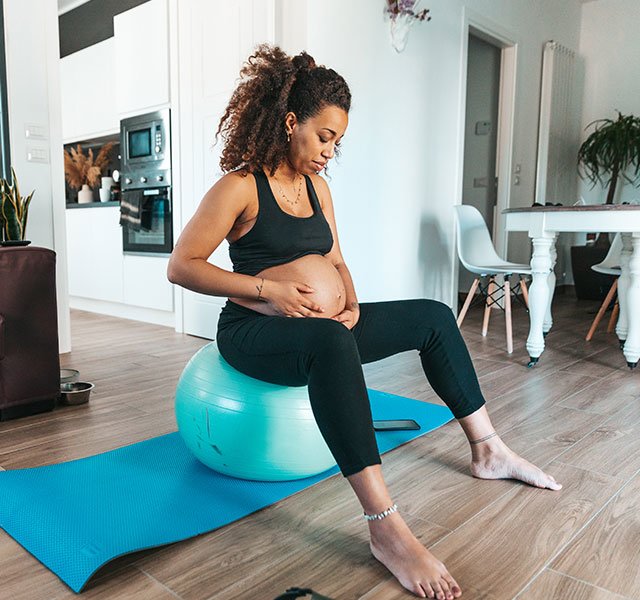Preeclampsia happens when women develop high blood pressure and other concerning symptoms during pregnancy or after delivery — and it's relatively common. Up to 8% of all pregnant women develop the condition.
"Preeclampsia usually begins later in pregnancy, after 20 weeks," says Raminder Khangura, M.D., a maternal-fetal medicine specialist at Henry Ford Health. "Preeclampsia can be severe, and can pose a great threat to a mom and her baby."
Unfortunately, signs of preeclampsia overlap with common pregnancy complaints, which can make it tough to detect.
What Causes Preeclampsia?
Preeclampsia is a concern during any pregnancy, in part because doctors aren't clear why it happens. "But even though we don't know the exact cause of preeclampsia, we know it begins in the placenta, the organ that nourishes the fetus," explains Dr. Khangura.
During early pregnancy, new blood vessels form to send blood to the placenta. But in women with preeclampsia, these newly formed vessels seem to malfunction. Again, doctors aren't clear why, but prevailing theories include:
- Genetics
- Insufficient blood flow to the uterus
- Blood vessel damage
- Immune system problems
Complications of preeclampsia include premature birth, hearing and vision problems, even kidney and liver failure.
What Are The Signs Of Preeclampsia?
Sometimes preeclampsia develops without any noticeable symptoms — that's why prenatal care is so important. At every visit, your doctor will test your urine for protein and monitor your blood pressure (levels over 140/90 can be cause for concern; low platelet levels and abnormal liver enzymes are also signs of preeclampsia).
Other symptoms of preeclampsia include:
- Severe headaches that don't improve with rest or pain relief medication like acetaminophen
- Visual changes
- Seizures
- Belly pain (usually the upper right side)
- Nausea and vomiting
- Peeing less
- Shortness of breath
- Swelling in the legs, hands and feet
"If you're expecting, it's important to be aware of the warning signs and have open conversations with your doctor about your risk," Dr. Khangura says. "Sometimes seemingly minor symptoms can signal something serious."
Who Is At Risk Of Developing Preeclampsia?
While doctors don't have a complete picture of what causes preeclampsia, they know that certain factors can up the odds that an expectant mom will develop it:
- A history of preeclampsia with a previous pregnancy
- Chronic health conditions, such as diabetes, hypertension, lupus and other autoimmune diseases
- First pregnancy
- Age (women over age 35 are more likely to develop preeclampsia)
- Race (African American women have an elevated risk of preeclampsia)
- Obesity
- Carrying multiples
- In-vitro fertilization
What Treatments Are Available For Preeclampsia?
Unlike other conditions that happen during pregnancy, preeclampsia only has one effective treatment: giving birth. Your doctor will talk you through the best time to deliver based on your individual risks and how far along your baby is.
"Our goal is to keep the baby in the womb until mom reaches at least 34 weeks," says Dr. Khangura. "Sometimes we use medication to help keep blood pressure levels stable. Some women have to be hospitalized." Unfortunately, symptoms of preeclampsia can last 6 weeks or more after delivery.
How Can You Prevent Preeclampsia?
Starting prenatal care early and attending every appointment is the best defense. Early prenatal care can help your doctor diagnose preeclampsia early and provide potentially lifesaving treatment.
"If you have a strong history of diabetes, suffer from obesity or if you have other factors that place you at higher risk of preeclampsia, your doctor may prescribe daily low-dose aspirin (81 mg) to reduce your risk," says Dr. Khangura. “But it's important to avoid taking medications, vitamins or supplements without consulting your doctor first.”
If you develop preeclampsia despite these efforts, follow up with your primary care doctor after delivery. "Pregnancy is a window to your future health," Dr. Khangura says. "Women who develop preeclampsia during pregnancy are at higher risk of heart disease and stroke down the line."
Subscribe today to receive weekly emails of our latest tips.
To find an obstetrician/gynecologist or certified nurse midwife at Henry Ford, visit henryford.com or call 1-800-436-7936.
Dr. Raminder Khangura is an OB/GYN and a maternal-fetal medicine specialist who sees patients at Henry Ford West Bloomfield Hospital and Henry Ford Medical Centers - Ford Road and New Center One.



